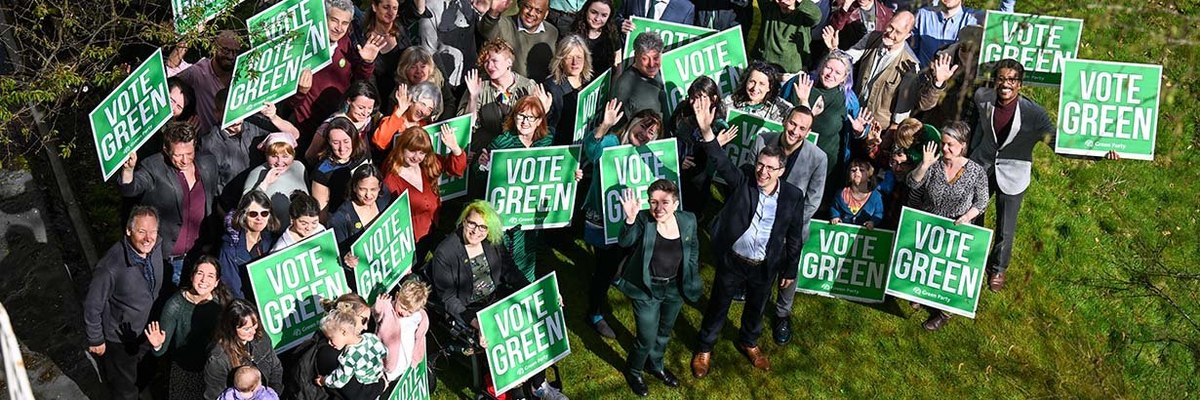Our most recent voting intention survey finds the Green party on 7% of the vote. If this comes to pass, this will be more than double the proportion of votes the party picked up at the 2019 general election.
The Greens are also set to add a historic second MP to their total in July, according to our MRP, and won a record number of councillors at the local elections in May. If these trends continue then the Greens may emerge as a more influential force in British politics in the coming years.
So what do Green voters believe? While most people could obviously point to a particular concern for the environment, and have a broader sense they that are on the left of the spectrum, what are their views specifically? And to what extent are the views of Green voters distinct from those of Labour voters, as well as the wider public?
What do Green voters believe?
Unsurprisingly, close to the top is the belief that the government should be doing and spending more in order to try and reduce carbon emissions (86%).
At the very top (although it should be noted, within the margin of error of the eponymous green policy), is the belief that gay couples should be allowed to get married, a view which 90% of Green voters hold.
Similar numbers also believe that the rich should be taxed more than average earners (89%), that the rich are also able to get away with more legally than the rest of us (88%), that utilities should be run in the public sector (88%) and that transport spending should favour improving public transport.
More than eight in ten Green voters likewise say that big businesses take advantage of ordinary people (85%), that ordinary people don’t get their fair share of the nation’s wealth (83%) and also want a closer relationship with the EU (84%).
At the other end of the scale, opinion is least one-sided when it comes to crime, defence and traditional values among the young. While the most common attitude among Green voters is that “the sentences that the courts hand down to people who have been convicted of crimes are not harsh enough”, this only represents 40% of the voting group – 10% think sentencing is too harsh, while 25% say it is neither too harsh nor not harsh enough.
On defence spending, 42% say that the government should spend less on defence, compared to 22% who want to spend more and 18% seem to want to keep it at current levels. On Ukraine specifically, 47% of Greens say that Britain’s approach should be to help Ukraine until they win, but 28% want a negotiated peace.
And for traditional values, 42% of Greens say that the young today have an appropriate amount of respect for traditional British values, compared to 28% who think the young are insufficiently respectful.
How do Green voters compare to Labour voters, as well as the wider public?
Across almost all of the issues there is a noticeable difference between the number of Green voters who hold each view and the wider public. This is likely because the Green electorate trends younger, while the general public trends older – and age is the biggest predictor of how someone will vote.
By contrast, in most ways Green voters’ views are similar to those of Labour voters – another group that tends to be younger.
However, there are some ways in which Green opinion is distinct from Labour opinion. Perhaps the most noticeable difference is on defence spending. Four in ten Green voters (42%) say that defence spending should fall, compared to 22% who say it should increase. For Labour voters these figures are flipped – 44% want to see defence budgets rise, while only 23% want to see them drop.
Green voters are also more likely to take an absolutist view on the NHS – a majority (56%) say that the NHS should operate completely without private providers, with only 30% saying the NHS should be able to use private companies to provide treatment. For 46% of Labour voters there is a place for private providers in the NHS, slightly more than the 39% who say there is not.
Unsurprisingly climate change is also a key distinguishing feature. While two thirds of Labour voters (67%) say that the government is not doing or spending enough to bring down carbon emissions, among Green voters this is a significantly higher 86%.
Another key difference is on Gaza, on which there is evidence to suggest the Greens are picking up alienated former Labour voters who are angered by Keir Starmer’s approach to the conflict. More than six in ten Green voters (63%) say that they sympathise more with the Palestinian side, compared to 45% of Labour voters.
Green voters are also notably less likely than Labour voters to say that criminal sentences in the UK are not harsh enough (40% vs 54%).
See the full results here
What do you think about the Greens, the election campaign in general, and everything else? Have your say, join the YouGov panel, and get paid to share your thoughts. Sign up here
Photo: Getty









